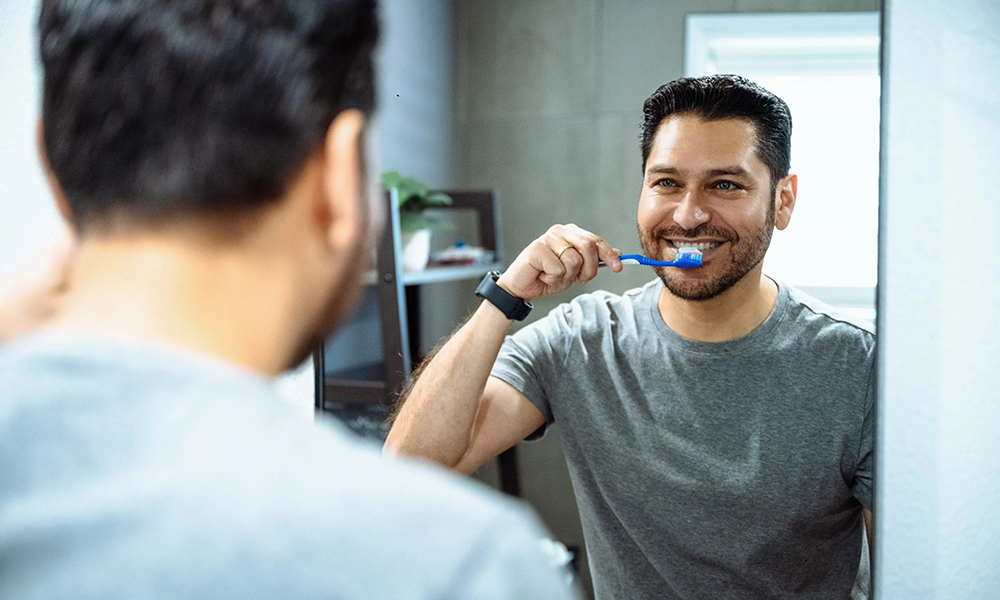
世界上有两种人:一种是在早餐前刷牙,另一种是在早餐后刷牙。那么,哪一种才是正确的呢?和大多数健康相关的问题一样,答案视情况而定。
什么时候是刷牙的最佳时间?
虽然牙科界对此看法不一,但凤凰城的牙医约森·盖斯特鲁姆博士(在TikTok上以@doctorjossen为人熟知)主张在早餐前刷牙。
盖斯特鲁姆博士对《财富》杂志表示:“我认为,早餐前刷牙有助于在牙齿表面形成一层保护层,还能在吃早餐前刺激唾液分泌。当你睡觉时,唾液分泌会减少,很多人因各种原因会在夜间感到口干。唾液有助于中和口腔中的酸性环境。这意味着你早上醒来时,由于唾液分泌减少,牙齿更容易受到酸性侵蚀,更不用说还有早晨的口气问题。”
但如果你坚持在吃完早餐后刷牙,盖斯特鲁姆博士建议至少等30分钟再刷,因为食物和饮料中的酸(尤其是咖啡)可能会损害牙釉质。而美国牙科协会(American Dental Association)则建议饭后至少等一小时再刷牙。
盖斯特鲁姆博士表示:“唾液大约需要30分钟来缓冲口腔中的酸性,使其恢复到安全水平。在此期间,你可以用水或像TheraBreath这样的碱性漱口水漱口,帮助中和口腔中的酸性,直到唾液发挥作用。”
刷牙的频率
你应该每天至少刷两次牙:早上一次,睡前一次。
盖斯特鲁姆博士表示:“我认为这两次同样重要,但睡前刷牙尤其关键,因为你要清除一天中积累的牙菌斑。我喜欢对孩子们(还有一些成年人)说:晚上刷牙是为了保护牙齿,早上刷牙是为了保持友谊。”
如果你想在午餐后多刷一次牙,盖斯特鲁姆博士建议饭后等30分钟再刷,以避免将食物中的酸刷进牙齿。但要记住,刷牙次数的增加并不意味着口腔更健康。
“我想大多数人的第一反应是,刷得越多越好。我同意,通过机械方式清除牙菌斑是预防蛀牙和改善牙龈健康的最佳方法,但只要你早晚刷得彻底,就没有必要过度刷牙。” 盖斯特鲁姆博士这样说道。
刷牙的最佳方式
大多数牙医推荐使用软毛或超软毛牙刷。成年人应使用豌豆大小的牙膏,将牙刷以45度角朝向牙龈,短距离来回刷动,确保清洁每一颗牙齿。过于用力刷牙可能会导致牙龈萎缩和牙釉质磨损。
盖斯特鲁姆博士指出:“如果你使用电动牙刷,要非常轻柔地用力,将牙刷以45度角朝向牙龈,沿着牙齿的外侧和内侧表面轻轻滑动,然后直接刷牙齿的咬合面。让电动牙刷自己完成工作——这正是你买它的原因。”
另外,你还需要每三到四个月更换一次牙刷,或者在你生病后立即更换。
保护牙齿的其他方法
良好的口腔健康也是整体健康的指标。最近,研究人员将牙龈疾病与心血管疾病、糖尿病、痴呆症、阿尔茨海默病,甚至勃起功能障碍联系起来。
除了定期刷牙,使用牙线对于保持牙龈的最佳健康状态也很重要。每天至少使用一次牙线可以帮助减少牙齿间产生蛀牙的几率。
盖斯特鲁姆博士表示:“水牙线,例如Waterpik,也是很好的辅助工具,能显著改善牙龈健康,特别适用于手部灵活性较差的患者。舌苔清洁也是一个常被低估的重要步骤,有助于减少口腔中的有害细菌。”
虽然含酒精的漱口水可能会使口腔干燥,但在刷牙前五分钟使用漱口水可以有效对抗晨间口气。
如果你难以坚持规律的刷牙习惯,盖斯特鲁姆博士建议选择一种你喜欢的牙膏味道;购买一把电动牙刷(许多电动牙刷都有内置计时器,帮助你准确知道刷牙时间);或者与朋友、家人或室友一起刷牙。
他表示:“这有助于建立联系,也能激励你养成持续的习惯。”(财富中文网)
翻译:刘进龙
审校:汪皓
世界上有两种人:一种是在早餐前刷牙,另一种是在早餐后刷牙。那么,哪一种才是正确的呢?和大多数健康相关的问题一样,答案视情况而定。
什么时候是刷牙的最佳时间?
虽然牙科界对此看法不一,但凤凰城的牙医约森·盖斯特鲁姆博士(在TikTok上以@doctorjossen为人熟知)主张在早餐前刷牙。
盖斯特鲁姆博士对《财富》杂志表示:“我认为,早餐前刷牙有助于在牙齿表面形成一层保护层,还能在吃早餐前刺激唾液分泌。当你睡觉时,唾液分泌会减少,很多人因各种原因会在夜间感到口干。唾液有助于中和口腔中的酸性环境。这意味着你早上醒来时,由于唾液分泌减少,牙齿更容易受到酸性侵蚀,更不用说还有早晨的口气问题。”
但如果你坚持在吃完早餐后刷牙,盖斯特鲁姆博士建议至少等30分钟再刷,因为食物和饮料中的酸(尤其是咖啡)可能会损害牙釉质。而美国牙科协会(American Dental Association)则建议饭后至少等一小时再刷牙。
盖斯特鲁姆博士表示:“唾液大约需要30分钟来缓冲口腔中的酸性,使其恢复到安全水平。在此期间,你可以用水或像TheraBreath这样的碱性漱口水漱口,帮助中和口腔中的酸性,直到唾液发挥作用。”
刷牙的频率
你应该每天至少刷两次牙:早上一次,睡前一次。
盖斯特鲁姆博士表示:“我认为这两次同样重要,但睡前刷牙尤其关键,因为你要清除一天中积累的牙菌斑。我喜欢对孩子们(还有一些成年人)说:晚上刷牙是为了保护牙齿,早上刷牙是为了保持友谊。”
如果你想在午餐后多刷一次牙,盖斯特鲁姆博士建议饭后等30分钟再刷,以避免将食物中的酸刷进牙齿。但要记住,刷牙次数的增加并不意味着口腔更健康。
“我想大多数人的第一反应是,刷得越多越好。我同意,通过机械方式清除牙菌斑是预防蛀牙和改善牙龈健康的最佳方法,但只要你早晚刷得彻底,就没有必要过度刷牙。” 盖斯特鲁姆博士这样说道。
刷牙的最佳方式
大多数牙医推荐使用软毛或超软毛牙刷。成年人应使用豌豆大小的牙膏,将牙刷以45度角朝向牙龈,短距离来回刷动,确保清洁每一颗牙齿。过于用力刷牙可能会导致牙龈萎缩和牙釉质磨损。
盖斯特鲁姆博士指出:“如果你使用电动牙刷,要非常轻柔地用力,将牙刷以45度角朝向牙龈,沿着牙齿的外侧和内侧表面轻轻滑动,然后直接刷牙齿的咬合面。让电动牙刷自己完成工作——这正是你买它的原因。”
另外,你还需要每三到四个月更换一次牙刷,或者在你生病后立即更换。
保护牙齿的其他方法
良好的口腔健康也是整体健康的指标。最近,研究人员将牙龈疾病与心血管疾病、糖尿病、痴呆症、阿尔茨海默病,甚至勃起功能障碍联系起来。
除了定期刷牙,使用牙线对于保持牙龈的最佳健康状态也很重要。每天至少使用一次牙线可以帮助减少牙齿间产生蛀牙的几率。
盖斯特鲁姆博士表示:“水牙线,例如Waterpik,也是很好的辅助工具,能显著改善牙龈健康,特别适用于手部灵活性较差的患者。舌苔清洁也是一个常被低估的重要步骤,有助于减少口腔中的有害细菌。”
虽然含酒精的漱口水可能会使口腔干燥,但在刷牙前五分钟使用漱口水可以有效对抗晨间口气。
如果你难以坚持规律的刷牙习惯,盖斯特鲁姆博士建议选择一种你喜欢的牙膏味道;购买一把电动牙刷(许多电动牙刷都有内置计时器,帮助你准确知道刷牙时间);或者与朋友、家人或室友一起刷牙。
他表示:“这有助于建立联系,也能激励你养成持续的习惯。”(财富中文网)
翻译:刘进龙
审校:汪皓
There are two types of people in the world: those who brush their teeth before breakfast and those who brush their teeth after breakfast. But which group is right? Well, like most health-related questions, it depends.
When is the best time to brush your teeth?
While there are varying opinions within the dental community, Dr. Jossen Gastelum, a Phoenix-based dentist better known as @doctorjossen on TikTok, is a proponent of brushing your teeth before breakfast.
“In my opinion, brushing your teeth before breakfast helps to add a protective coating onto your teeth and can even help to stimulate your saliva before you eat breakfast,” Gastelum tells Fortune. “When you’re sleeping, your salivary flow decreases, and many people experience dry mouth for various reasons. Saliva helps to buffer out the acidity in your mouth. This means that your teeth are more prone to acid attacks in the morning right when you wake up—not to mention morning breath, too.”
But if you insist on brushing your teeth after your first meal of the day, Gastelum suggests waiting at least 30 minutes after you’ve finished eating, as the acids in your food and drinks (especially coffee) can damage the enamel, while the American Dental Association recommends waiting at least an hour after eating to brush your teeth.
“Your saliva takes about 30 minutes to buffer out the acids in your mouth back down to safe levels,” he says. “In the interim, you can swish with either water or an alkaline mouth rinse like TheraBreath to help neutralize the acids in your mouth while your saliva gets to work.”
How often to brush your teeth
You should aim to brush your teeth at least twice a day: once in the morning and once before going to bed.
“Both times are equally important in my opinion, but before bed is especially crucial because you want to brush away all the plaque accumulated during the day,” says Gastelum. “I like to tell kids (and some adults): You brush your teeth at night to keep your teeth, and you brush your teeth in the morning to keep your friends.”
If you want to squeeze in a midday toothbrushing, say, after lunch, Gastelum recommends waiting 30 minutes after your meal to avoid brushing acids into your teeth. But keep in mind that more brushing doesn’t automatically equate to better oral health.
“I think most people’s first instinct is that the more they brush, the better,” he says. “I agree that mechanical disruption of plaque is the best way to prevent cavities and improve gum health, but it is not necessary to obsessively brush as long as you’re doing it well in the morning and at night before bed.”
The best way to brush your teeth
A soft or extra soft toothbrush is recommended by most dentists. Adults should use a pea-size amount of toothpaste and hold the toothbrush at a 45-degree angle toward your gums while brushing back and forth in short strokes to get every tooth. Aggressive brushing can result in gum recession and enamel wear.
“If you have an electric toothbrush, use very gentle pressure and glide the toothbrush on each tooth at a 45-degree angle toward the gum on the outside and inside surfaces, and then straight onto the top surfaces of your teeth,” says Gastelum. “Let the brush do all the work—that’s what you bought it for.”
You’ll also want to change your toothbrush every three to four months, or anytime after you’ve been sick.
Other ways to protect your teeth
Good oral health is indicative of overall health as well. Recently, researchers have linked gum disease to cardiovascular disease, diabetes, dementia, Alzheimer’s disease, and even erectile dysfunction.
In addition to regular brushing, flossing is important for keeping your gums at optimal health. Flossing at least once a day can help reduce your chances of getting cavities in between your teeth.
“Water flossers, for example Waterpik, are great adjuncts as well, which really improve gum health, especially in patients with low dexterity,” says Gastelum. “Tongue scraping is also very underrated and important for reducing bad bacteria in your mouth.”
Using mouthwash five minutes before brushing your teeth can help counter morning breath, although alcohol-based mouthwash can dry out your mouth.
If you struggle with maintaining a consistent toothbrushing routine, Gastelum recommends finding a toothpaste flavor you’re excited to use; investing in an electric toothbrush (many of them include built-in timers so you know exactly how long to brush); and brushing with a friend, family member, or roommate.
“It helps build connections and also motivates you to make it a consistent habit,” he says.






